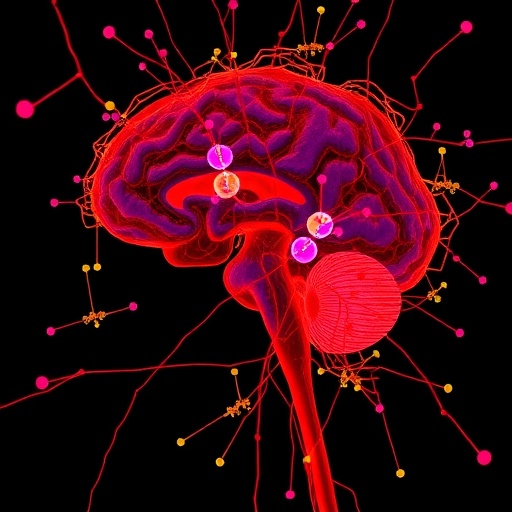In a groundbreaking study published in Nature Metabolism, researchers have unveiled new insights into the role of mitochondrial complex III-derived reactive oxygen species (ROS) in modulating immunometabolic function within astrocytes and their contributory role in dementia pathology. This research advances our understanding of the cellular and molecular mechanisms at the intersection of mitochondrial dysfunction, neuroinflammation, and neurodegeneration—key pathological hallmarks of dementia disorders such as Alzheimer’s disease.
Astrocytes, the star-shaped glial cells in the brain, are crucial for maintaining neural homeostasis, synaptic function, and neurovascular coupling. Historically overshadowed by neurons in neurodegeneration research, astrocytes are now being recognized for their dynamic immunometabolic roles, which can profoundly affect brain health. The study places mitochondrial complex III, a pivotal component of the mitochondrial electron transport chain, at the heart of astrocytic metabolic reprogramming through ROS generation.
Mitochondria are known not only as ATP powerhouses but also as signaling organelles whose reactive oxygen species production can act as secondary messengers in various cellular pathways. The study highlights that ROS derived specifically from complex III, rather than other complexes like I or IV, significantly reshape the immune-metabolic landscape within astrocytes. This selective source of ROS appears to orchestrate inflammasome activation, cytokine secretion, and metabolic shifts, including altered glycolysis and oxidative phosphorylation rates.
Delving deeper, the researchers utilized state-of-the-art genetic and pharmacological tools to modulate complex III activity selectively. They demonstrated that heightened ROS production correlates with a pro-inflammatory astrocytic phenotype that exacerbates neuroinflammation—a known driver of dementia progression. Moreover, this pro-inflammatory shift was associated with metabolic remodeling that supports sustained inflammation, implicating metabolic immunity as a self-perpetuating loop in neurodegenerative pathology.
The significance of this finding lies in the metabolic nexus formed by ROS signaling and immune response. It challenges the traditional neuron-centric paradigm in neurodegeneration, offering a clearer picture of how glial cells contribute actively to disease trajectories. Specifically, the study links mitochondrial dysfunction within astrocytes to pathological processes that ultimately manifest as cognitive decline and dementia symptoms, thus identifying new therapeutic targets.
In experimental animal models that mimic dementia pathology, the inhibition of complex III-generated ROS yielded pronounced attenuation of neuroinflammatory markers and improvement in behavioral outcomes. These results not only validate the pathological role played by astrocytic mitochondrial ROS but also offer hope for interventions that modulate mitochondrial metabolism to preserve cognitive function.
The multidimensional approach taken by the authors enabled a detailed characterization of the astrocytic immunometabolic state through single-cell transcriptomics and metabolomic profiling. This holistic view revealed complex intercellular signaling pathways and metabolic flux changes, underscoring the intricate crosstalk between energy metabolism and immune response in the brain’s cellular milieu.
Of particular note is the researchers’ exploration of how mitochondrial ROS influence the activation of the NLRP3 inflammasome, a critical innate immune sensor that contributes to chronic inflammation in neurodegenerative diseases. The mechanistic insights provided establish mitochondrial ROS as a pivotal upstream activator of inflammasome pathways in astrocytes, linking cellular metabolism directly to inflammatory disease pathways.
Clinically, this work propels the field closer to biomarker discovery and targeted therapy development. Since mitochondrial ROS and astrocyte metabolic states can be modulated pharmacologically, this research opens avenues for novel drugs that could attenuate or even reverse dementia progression. The specificity of complex III as a ROS source presents an attractive target for precision therapeutics that minimize off-target effects seen in broader antioxidant strategies.
Furthermore, the findings carry implications beyond dementia, potentially informing our understanding of other neuroinflammatory and neurodegenerative disorders where glial metabolism and immune dysregulation are central themes. The paradigm shift recognizing mitochondrial ROS as signaling hubs rather than mere toxic by-products reshapes therapeutic approaches across a wide spectrum of brain diseases.
This study also underscores the importance of interdisciplinary approaches combing neurobiology, immunology, and metabolism to decode the complexity of brain diseases. The integration of metabolic and immune profiling techniques employed in this research sets a new standard for exploring cellular dysfunction in other neurological contexts.
Overall, the revelations regarding mitochondrial complex III-derived ROS in astrocytes bring to light an underappreciated yet critical driver of dementia pathology. By linking energy metabolism to immune activation at the cellular level, the research provides a fresh lens through which to view and tackle this debilitating group of diseases that affects millions worldwide.
As the global population ages and dementia prevalence rises, the urgent need for transformative research cannot be overstated. Insights like these pave the way for innovative diagnostics and therapeutics that target disease mechanisms early, potentially altering the course of neurodegeneration before irreversible damage occurs.
While further studies are warranted to translate these experimental findings into clinical practice, the discovery of mitochondrial complex III as a gatekeeper of neuroinflammatory and metabolic dysregulation highlights a promising frontier in dementia research. The ability to modulate astrocytic function through mitochondrial pathways could revolutionize how clinicians manage cognitive decline in the future.
Ultimately, this research marks a significant milestone by revealing how the interplay of mitochondria-derived ROS and astrocyte immunometabolism not only amplifies neuroinflammation but also actively drives dementia progression. It challenges scientists and clinicians alike to intensify the search for mitochondrial-targeted therapies capable of restoring brain health and cognitive resilience.
Subject of Research: Mitochondrial complex III-derived reactive oxygen species (ROS) influence immunometabolic changes in astrocytes and their contribution to dementia pathology.
Article Title: Mitochondrial complex III-derived ROS amplify immunometabolic changes in astrocytes and promote dementia pathology.
Article References:
Barnett, D., Zimmer, T.S., Booraem, C. et al. Mitochondrial complex III-derived ROS amplify immunometabolic changes in astrocytes and promote dementia pathology. Nat Metab (2025). https://doi.org/10.1038/s42255-025-01390-y
Image Credits: AI Generated
DOI: https://doi.org/10.1038/s42255-025-01390-y




